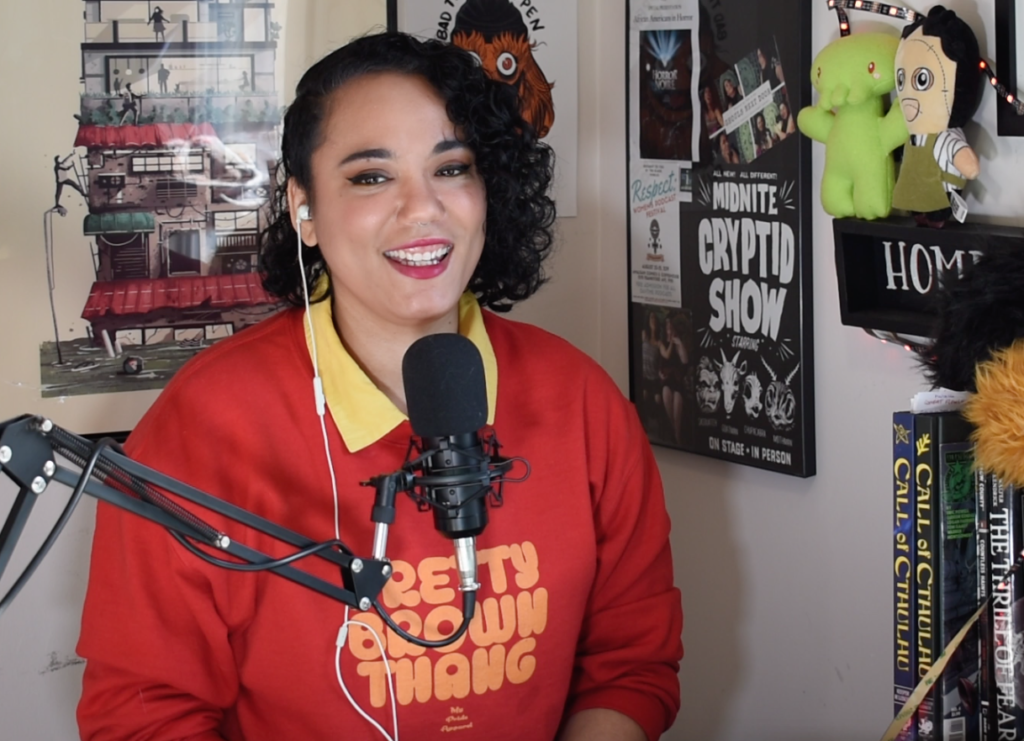
08 Nov Philadelphia Artist Spotlight: Bettina Escauriza
BY GABE CASTRO
The cinéSPEAK Journal publishes a monthly Philadelphia Artist Spotlight highlighting local filmmakers and moving image artists doing unique and impactful work.
Bettina Escauriza is a filmmaker, writer, artist, and actor living in Philadelphia. Originally from Asunción, Paraguay, her work is influenced by her culture and experiences dealing with Indigenous knowledge, colonization, immigration, and exile. She is a natural storyteller from a family of “frustrated mystics, spectacular liars, ill-fated thieves, and awful politicians.” Her aim as a filmmaker is to tell stories about Indigenous people and people of color that are “lush, sensual, thrilling, and complex”— she wants to tell the truth about the communities she comes from by “centering narratives of joy, defiance, and resistance in the face of oppression.”
Escauriza’s latest work, Tonight, We Eat Flowers, follows two characters: Luis, a recent immigrant and former doctor who works a soulless job selling phone hold music to corporations while saving money to get certified in Emergency Medical Services, and Jamilah, a brilliant gourmet chef who is stuck working in a cubicle hellscape and dreams of a life of sensuality, color, and flavor. They find themselves dealing with a crisis which reveals that the two have a great deal in common and leads to an unlikely romance. Escauriza developed this quirky, unexpected comedy as part of the BlackStar Philadelphia Filmmaker Lab.
Her other work reaches beyond filmmaking into the nonfiction, journalistic world. Escauriza does international human rights work at the United Nations, focusing specifically on the role of Indigenous Peoples and Indigenous knowledge in mitigating the climate crisis. She is also the Community News Producer at PhillyCAM and a film instructor for Philadelphia youth at Big Picture Alliance.
cinéSPEAK asked Escauriza about her filmmaking journey, what inspired Tonight, We Eat Flowers, and what themes she works to explore on screen.
cinéSPEAK: What inspired you to be a filmmaker?
Bettina Escauriza: I always wanted to be a filmmaker, ever since I was a kid, but it took a long and winding journey to get to where I’m at now. The reality is that when I was young I could not figure out how to become a filmmaker. Truthfully I still have no idea how to do it, but that’s a longer discussion.
I get inspiration for the scripts I write and the art I make from everywhere. I have a lot of curiosity about the world. I feel really inspired every day by the things I encounter either in books, or through conversations, or by just walking around the city. I am also really inspired by nature, both being in it and contemplating it. I love stories. I think that being a good storyteller is a world-changing skill. I will pursue the craft of storytelling for the rest of my life and I hope to get better at it little by little everyday.
cinéSPEAK: Where did the idea for Tonight, We Eat Flowers come from?
BE: It was born during a particularly long phone hold session I experienced while trying to sort out some mundane catastrophe with some corporate or government entity who could easily destroy my life out of either want or negligence. As I was waiting for the likely unintelligible and completely unnecessary interaction to actually take place, I was left with a song that was about 30 seconds worth of what I would describe as placid tension jazz that played in an endless loop. This was the sonic equivalent of a soggy bread straitjacket. It was smooth, mealy-mouthed, and apologetic, yet it had an inexplicable ever-rising, never-concluding, sense of urgency to it.
I paced around my flat for 45 minutes listening to this peculiar monstrosity and I wondered about all the people’s work that it must have taken to get to that moment of me listening to that song—and that’s it, that’s where the idea for the story came from. I invented Luis and Jamilah and their life (that’s not too different from mine) out of a sense of necessity to deeply contemplate this weird artifact of modern life in the shape of a song. At the time, I was in the process of applying to the BlackStar Philadelphia Filmmaker Lab, but with a different script. I decided to put that story on ice and chase this funny story about phone hold music, the desire for a different life, and love.
cinéSPEAK: What topics and themes are you exploring in your current work?
BE: If I had to boil down the film to one word, that word would be desire. It’s a story about want—wanting a different life. Wanting sensuality, color, and flavor. Desiring connection. Wanting to be known. Yearning for things to change. The desire to live a dignified life where we spend our time pursuing what we love alongside the people we care about.
Both Luis and Jamilah dislike their jobs, but there’s not much that they can do about it, so they trudge on while finding ways to express their authentic selves whenever they can. I wrote these characters because I identify with them—I think a lot of people would. It’s likely that most of us would be living very different lives if we had the chance to.
The film touches upon issues of immigration, working class identities, Latin people in the US, microaggressions, alienation, and the desire for romantic love all within the framework of an offbeat comedy. Apart from all the themes in the film, one of the main things I am exploring is comedy as a genre. I am drawn to comedy because I feel that it has a greater capacity for social transformation than drama or tragedy do. I also find it to be an incredibly difficult form.
To my mind comedy has endless potential—it occupies a lot of territory. And I find the desire to make people laugh is rooted in solidarity and kindness and I’m drawn to having those be central elements in my work. I want the films I make to be fun, to be free, and to feel open-ended, so that they hopefully do the work of creating new possibilities through humor instead of through tears.
Escauriza’s film is currently making its rounds in the film festival circuit. Be sure to follow the artist to catch it at the next festival.
*Featured Image: Image of Bettina Escauriza. Courtesy of the filmmaker.
Would you like to be featured in a future spotlight? Please fill out the Philadelphia Artist Spotlight form. The cinéSPEAK Journal maintains sole discretion over the publishing of any information provided via the form. Questions: journal@cinespeak.org

Gabe Castro is a Philadelphia-based Latiné multimedia professional specializing in the horror genre. Gabe believes media can be used as a tool to bring social change and works in all she does to create impactful and inspiring media.

Sorry, the comment form is closed at this time.